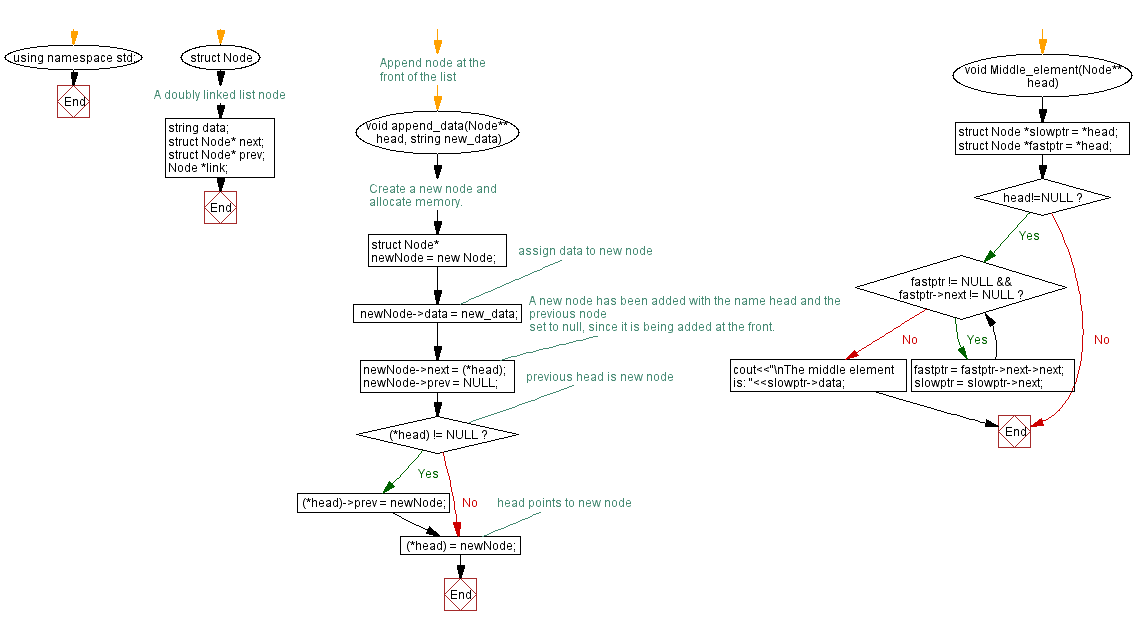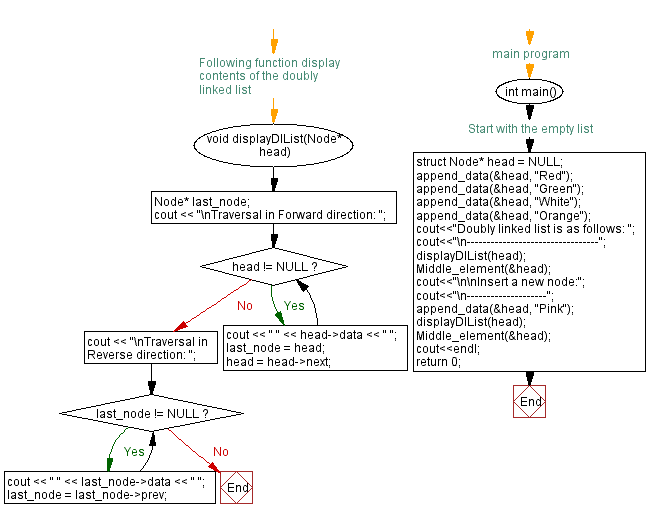C++ Linked List Exercises: Middle element of a Doubly Linked List
20. Find the Middle Element of a Doubly Linked List
Write a C++ program to find the middle element of a given Doubly Linked List.
Test Data:
Doubly linked list is as follows:
------------------------------
Traversal in Forward direction: Orange White Green Red
Traversal in Reverse direction: Red Green White Orange
The middle element is: Green
Insert a new node at the end of a Doubly Linked List:
-------------------------------------------------------------
Traversal in Forward direction: Pink Orange White Green Red
Traversal in Reverse direction: Red Green White Orange Pink
The middle element is: White
Sample Solution:
C++ Code:
#include <iostream> // Including input-output stream header file
using namespace std; // Using standard namespace
// A doubly linked list node
struct Node {
string data; // Data field to store string data
struct Node* next; // Pointer to the next node
struct Node* prev; // Pointer to the previous node
Node *link; // Additional pointer, not used in the code
};
// Function to append data at the front of the doubly linked list
void append_data(Node** head, string new_data)
{
// Create a new node and allocate memory.
struct Node* newNode = new Node;
// Assign data to the new node
newNode->data = new_data;
// A new node has been added with the name head and the previous node
// set to null, since it is being added at the front.
newNode->next = (*head);
newNode->prev = NULL;
// Previous head is the new node
if ((*head) != NULL)
(*head)->prev = newNode;
// Head points to the new node
(*head) = newNode;
}
// Function to find and display the middle element of the doubly linked list
void Middle_element(Node** head)
{
struct Node *slowptr = *head;
struct Node *fastptr = *head;
if (head!=NULL)
{
while (fastptr != NULL && fastptr->next != NULL)
{
fastptr = fastptr->next->next;
slowptr = slowptr->next;
}
cout<<"\nThe middle element is: "<<slowptr->data;
}
}
// Following function displays contents of the doubly linked list
void displayDlList(Node* head)
{
Node* last_node;
cout << "\nTraversal in Forward direction: ";
while (head != NULL) {
cout << " " << head->data << " "; // Displaying data in forward direction
last_node = head;
head = head->next;
}
cout << "\nTraversal in Reverse direction: ";
while (last_node != NULL) {
cout << " " << last_node->data << " "; // Displaying data in reverse direction
last_node = last_node->prev;
}
}
// Main program
int main() {
/* Start with the empty list */
struct Node* head = NULL; // Initializing the head of the linked list as NULL
append_data(&head, "Red"); // Appending "Red" at the front of the list
append_data(&head, "Green"); // Appending "Green" at the front of the list
append_data(&head, "White"); // Appending "White" at the front of the list
append_data(&head, "Orange"); // Appending "Orange" at the front of the list
cout<<"Doubly linked list is as follows: ";
cout<<"\n---------------------------------";
displayDlList(head); // Displaying the doubly linked list
Middle_element(&head); // Finding and displaying the middle element
cout<<"\n\nInsert a new node:";
cout<<"\n--------------------";
append_data(&head, "Pink"); // Inserting "Pink" node at the front of the list
displayDlList(head); // Displaying the updated doubly linked list
Middle_element(&head); // Finding and displaying the new middle element
cout<<endl;
return 0; // Returning from the main function
}
Sample Output:
Doubly linked list is as follows: --------------------------------- Traversal in Forward direction: Orange White Green Red Traversal in Reverse direction: Red Green White Orange The middle element is: Green Insert a new node: -------------------- Traversal in Forward direction: Pink Orange White Green Red Traversal in Reverse direction: Red Green White Orange Pink The middle element is: White
Flowchart:


For more Practice: Solve these Related Problems:
- Write a C++ program to determine the middle element of a doubly linked list using two-pointer technique and display its value.
- Develop a C++ program that finds the middle node of a doubly linked list and prints both its value and its index position.
- Design a C++ program to compute and display the middle element of a doubly linked list even when the list has an even number of nodes.
- Implement a C++ program to locate the middle element in a doubly linked list and highlight it during the list traversal output.
Go to:
PREV : Insert Node at the End of Doubly Linked List.
NEXT : Insert Node at the Middle of Doubly Linked List.
C++ Code Editor:
Contribute your code and comments through Disqus.
What is the difficulty level of this exercise?
